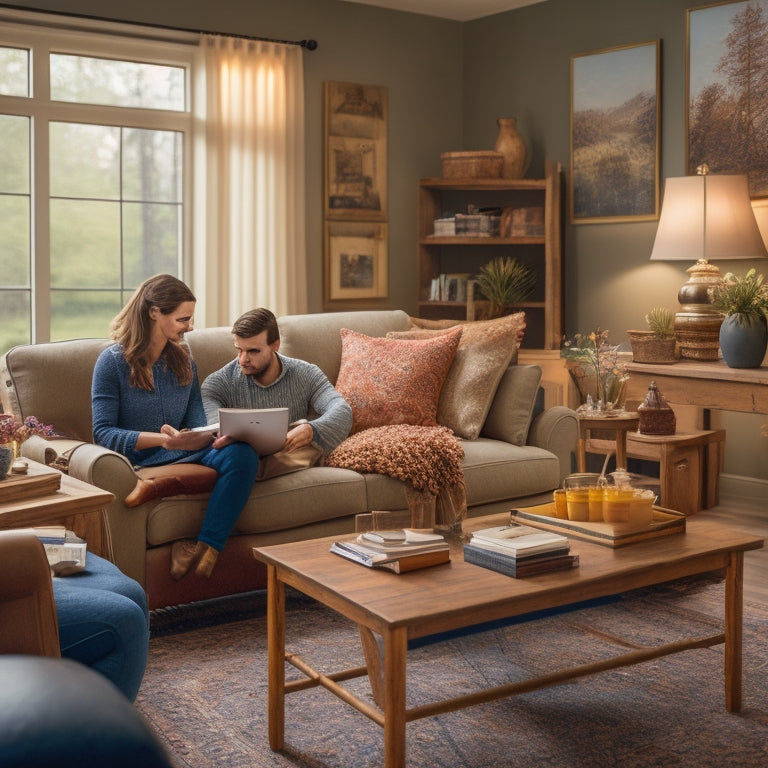
Essential Checklist for Home Buyers
Share
To successfully navigate the home buying process, having a thorough checklist in place is crucial. This starts with defining your home requirements, including identifying must-have features, budget planning, and location preferences. Next, evaluate properties effectively by analyzing condition, neighborhood, and prioritizing preferences. Finally, maximize your search by concentrating on properties that meet your needs and budget. By following this structured approach, you'll be well-prepared to find your ideal property. By grasping these crucial components, you'll be able to streamline your search and make a well-informed decision, ultimately securing the perfect property that fits your needs.
Key Takeaways
• Identify essential home features that matter most to guide property evaluation and ensure needs are met.
• Determine a budget and stick to it to avoid overspending and financial stress.
• Assess property condition, neighborhood, and local market trends to make an informed decision.
• Prioritize 'must-haves' and preferences to focus on non-negotiables and stay within budget.
• Research neighborhoods, property condition, and resale value to maximize home search and find the right fit.
Defining Your Home Requirements
Before beginning your home search, it is essential to define your home requirements by identifying the features that matter most to you, as this will serve as a guiding framework for evaluating properties and ensuring that your new home meets your needs and preferences.
Budget planning is a critical aspect of this process, as it determines the price range you can afford. Location preferences also play a significant role, as they impact commute time, schools, and overall quality of life.
Evaluating Properties Effectively
What sets apart a savvy home buyer from a stressed-out one is the ability to evaluate properties effectively, separating the ideal from the impractical. A thorough property assessment involves a condition assessment, neighborhood evaluation, and comparison of up to three properties.
This enables buyers to identify their 'must-haves' and prioritize their preferences. Feature prioritization is critical, as it helps buyers focus on their non-negotiables, such as the number of bedrooms and bathrooms. Pricing comparison is also vital, ensuring buyers stay within their budget.
Maximizing Your Home Search
To maximize your home search, it's essential to define your priorities and criteria, including the features that matter most to you, such as garage size, minimum and maximum price, and the number of bedrooms and bathrooms. By doing so, you'll be able to focus on properties that meet your needs and budget.
Consider the following important factors to refine your search:
- Identify your budget planning strategy to determine your price range
- Prioritize your location preference, considering factors like proximity to work, schools, and amenities
- Research neighborhoods and local market trends
- Evaluate the condition and age of properties
- Consider resale value and potential for future growth
Frequently Asked Questions
What Are the Average Costs of Homeowners Insurance and Property Taxes?
When considering homeownership, it's essential to factor in insurance coverage and property taxes, with average annual costs ranging from 0.5% to 2.5% of the home's value, depending on location and risk factors, making cost comparison vital.
How Do I Know if a Neighborhood Is Zoned for a Specific School District?
To ascertain if a neighborhood is zoned for a specific school district, research school ratings and boundaries, review local zoning regulations, and inquire about enrollment policies to guarantee a seamless educational experience.
Can I Back Out of a Contract if I Find a Better Property?
Just as a sailor must navigate through uncharted waters, a homebuyer may encounter unexpected twists in their journey. While it's tempting to abandon ship, contract obligations are binding; however, alternatives like contingencies or renegotiation can provide an escape route, mitigating buyer's remorse and financial impact.
What Is the Typical Timeframe for Closing on a New Home?
The typical timeframe for closing on a new home ranges from 30 to 60 days, contingent on factors such as mortgage preapproval and closing costs, ensuring a smooth shift to homeownership.
Are Home Warranties Usually Included in the Purchase Price?
Typically, home warranties are not included in the purchase price, but savvy buyers can negotiate options, such as requesting the seller to provide coverage or factoring the cost into the overall deal.
Related Posts
-
Versatile Stainless Steel Carving Fork: Serve And Carve Meat Safely
In the world of culinary arts, precision and safety are paramount. Imagine a versatile stainless steel carving fork t...
-

10 Best Online Low-Carb Meal Planning Courses
You're looking for a structured approach to low-carb meal planning, and online courses can provide the guidance and s...
-

Why Keto Dieters Need a Meal Planning System
You need a meal planning system to supercharge your keto diet because without one, you'll be stuck in a vicious cycle...

